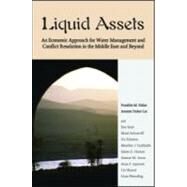Liquid Assets
, by Fisher, Franklin M.; Huber-Lee, Annette; Amir, Ilan; Arlosoroff, Shaul; Eckstein, Zvi; Haddadin, Munther J.- ISBN: 9781933115085 | 1933115084
- Cover: Hardcover
- Copyright: 9/15/2005
Liquid Assets shows that the common view of water as an inevitable cause of future wars is neither rational nor necessary. Typically, two or more parties with claim to the same water sources are thought to play a zero-sum game with each side placing a high emotional and political value over the ownership of the water. However, Franklin Fisher and his coauthors demonstrate that when disputes in ownership are expressed as disputes about money values, in most cases, the benefits of ownership will be surprisingly small. By assigning an economic value to water and treating water as a tradable resource, parties see that the gains from cooperation exceed the costs resulting from the change in ownership. A zero-sum game becomes a win-win situation. To support this new approach, Liquid Assets presents an innovative water allocation model that can be used to assist water management, the cost-benefit analysis of water infrastructure, and the resolution of disputes. The model takes system-wide effects into account and is the first to overcome the failure of actual water markets to cope with the divergence between social and private benefits (as implied by agricultural subsidies), permitting the model-user to impose his or her own values or policies. Liquid Assets applies its methodology to Israel, Jordan, and Palestine, a region where water is scarce and water conflicts are often thought to be explosive. Indeed, this book is the result of a joint effort of Israeli, Jordanian, Palestinian, American, and Dutch experts. But the book's message and methods are not restricted to the Middle East. They are applicable to water management and water disputes around the globe.






